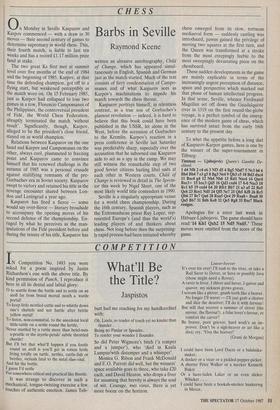CHESS
Barbs in Seville
Raymond Keene
0 n Monday in Seville Kasparov and Karpov commenced — with a draw in 30 moves — their second century of games to determine supremacy in world chess. This, their fourth match, is liable to last ten weeks and has a record £1.17 million prize fund at stake.
The two great Ks first met at summit level over five months at the end of 1984 and the beginning of 1985. Karpov, at that time the defending champion, got off to a flying start, but weakened perceptibly as the match wore on. On 15 February 1985, Just as Karpov had collapsed to lose two games in a row, Florencio Campomanes of the Philippines, the controversial president of Fide, the World Chess Federation, abruptly terminated the match 'without result'. Significantly, though, Karpov, alleged to be the president's close friend, stayed on as world champion.
Relations between Kasparov on the one hand and Karpov and Campomanes on the other, always cool, plummeted to freezing point and Kasparov came to convince himself that his renewed challenge in the autumn of 1985 was a personal crusade against stultifying remnants of the pre- Gorbachev era in Soviet society. Kasparov swept to victory and retained his title in the revenge encounter shared between Lon- don and Leningrad a year ago.
Kasparov has fired a fierce — some Would say over-fierce — literary broadside to accompany the opening moves of his second defence of the championship. En- raged by what he perceives as the man- ipulations of the Fide president before and during the tenure of his title, Kasparov has written an abrasive autobiography, Child of Change, which has appeared simul- taneously in English, Spanish and German just as the match started. Much of the text consists of fiery condemnation of Campo- manes and of what Kasparov sees as Karpov's machinations to impede his march towards the chess throne.
Kasparov portrays himself, in relentless contrast, as a true son of Gorbachev's glasnost revolution — indeed, it is hard to believe that this book could have been published in the USSR, let alone in the West, before the accession of Gorbachev to the Kremlin. Karpov's reaction in a press conference in Seville last Saturday was predictably sharp, especially over the accusation that he suborned one Kasparov aide to act as a spy in the camp. We may still witness the remarkable step of two good Soviet citizens hurling libel suits at each other in Western courts. Child of Change is reviewed in detail in The Specta- tor this week by Nigel Short, one of the most likely world title contenders in 1990.
Seville is a singularly appropriate venue for a world chess championship. During the 16th century, Spanish players, such as the Extremaduran priest Ruy Lopez, rep- resented Europe's (and thus the world's) leading players of and thinkers about chess. Not long before then the surprising- ly rapid process had been initiated whereby chess emerged from its slow, tortuous mediaeval form — suddenly castling was introduced, pawns gained the privilege of moving two squares at the first turn, and the Queen was transformed at• a stroke from the most creepingly feeble to the most sweepingly devastating piece on the chessboard.
These sudden developments in the game are mainly explicable in terms of the increasingly urgent perception of distance, space and perspective which marked out that phase of human intellectual progress. In that sense, Seville, whence Ferdinand Magellan set off down the Guadalquivir river in 1519 on the first round-the-globe voyage, is a perfect symbol of the emerg- ence of the modern game of chess, which has survived intact from the early 16th century to the present day.
To whet the appetite before a long diet of Kasparov-Karpov games, here is one by the winner of the super-tournament in Tilburg: Tinunan — Ljubojevic: Queen's Gambit De- clined.
1 d4 Nf6 2 c4 e6 3 Nf3 d5 4 Bg5 Nbd7 S Nc3 h6 6 Bh4 Bb4 7 e3 g5 S Bg3 Ne4 9 Qb3 c5 10 Bd3 ditc4 11 Bxc4 g4 12 Nh4 Nb6 13 Rdl Nxc4 14 Qxc4 Bxc3+ 15 bxc3 Qd5 16 Qd3 cxd4 17 0-0 Nxc3 18 Rd l b5 19 exd4 b4 20 Rfel Bb7 21 a3 a522 Re5 Qc6 23 Rcel Nd5 24 Qf5 Ne7 25 Qh5 KM 26 Rc5 Qb6 27 Bc7 Qa6 28 Rrta5 Qc4 29 Rxa8+ Ibta8 30 Qa5 Bb7 31 846 Ke8 32 Qe5 Rg8 33 Bxe7 Black resigns.
Apologies for a error last week in Htibner-Ljubojevic. The game should have read:'14 Khl Qxb2 15 Nd5 Nxd5.' These moves were omitted from the score of the game.


























































 Previous page
Previous page